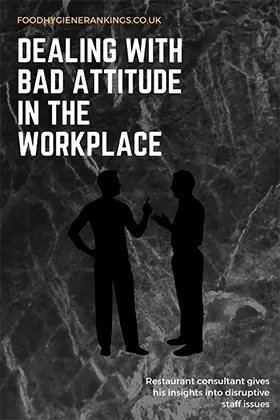
In this article guest writer and restaurant turn-around consultant Ian Goring gives his insights into dealing with disruptive staff issues.
Bad attitude…. Its a bad term and after writing it, I would encourage you not to use it. Why? Because as a manager, saying someone has a bad attitude is vague and of no real help to you in dealing with the situation. This is because:
As a manager you should not think of your teams as having a bad attitude, or a lazy attitude. Attitude is a catch all word that does not define the issues or lead to a resolution. There are no attitude problems; but there are:
Many managers throw their hands in the air and believe that they cannot do anything about these employees. However this is not the case. The above behaviors are not acceptable and can and should be managed just like any other expectation. In the same way that you would manage an employees attendance record or quantity or quality of work produced, the above behaviors should not be ignored.
Saying that an employee has a bad attitude is just a cop out because dealing with performance issues around employee’s demeanor and communication style is hard. As long as you call it a bad attitude, you can rationalize doing nothing but complaining about it. It is not easy to talk to an employee about these topics but it will cause more hardship in the long run to leave your team to deal with it every day. A research study by Samsung Electronics showed that 84% of workers in small businesses reported Moaning as a workplace disruption and 30% reported leaving a job due to irritating co-workers. By setting and maintaining expected levels of behaviour you can stop this drain on your business.
Few employees with so-called bad attitudes get good clear feedback and fewer still are held accountable for being productive members of the team. When planning to speak to the team member you should think about
Rather than pressuring the employee into confessing to or apologizing for his or her negative attitude, confront the issue directly with the employee by informing him or her that you are aware of the problem and will be monitoring it, using the answers to the above questions to drive home the reasons their behaviour is unacceptable.
An employee who complains, argues, or gossips excessively in the workplace can be disruptive to a company's environment. Such negativity often translates to poor job performance and can create low morale in the company. Therefore, having proactive policies and programs in place to ensure a workplace that is positive and rewarding, as well as having managers who are able to deal with disruptive behaviour in a positive and swift way, can make a huge difference towards greater employee satisfaction and productivity.
For further reading on the issue, Ian recommends Coaching for Performance: The Principles and Practice of Coaching and Leadership by Sir John Whitmore